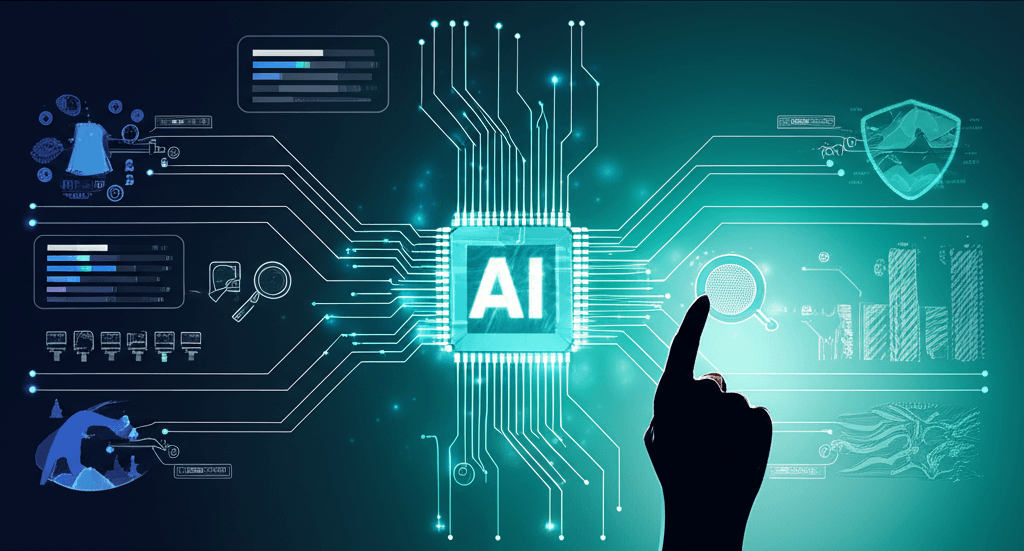AI Rewrites Insurance Playbook: Industry Shifts from Reactive to Proactive
Beyond automation: AI is revolutionizing insurance with proactive risk management, personalized services, and unprecedented efficiency.
July 11, 2025

Artificial intelligence is fundamentally rewriting the operational playbook of the insurance industry, a sector traditionally characterized by its cautious and risk-averse nature. The technology is no longer a futuristic concept but a vital component across the insurance value chain, from intricate risk calculations and underwriting to claims processing and customer interactions. While adoption is widespread, with nearly 90% of insurance executives identifying AI as a top strategic initiative for 2025, the depth of implementation varies significantly.[1] This technological overhaul is forcing a shift from a reactive "detect and repair" model to a proactive "predict and prevent" approach, reshaping the very core of the insurance business model.[2][3]
One of the most profound impacts of AI has been on the underwriting and risk assessment process, a cornerstone of the insurance business.[4] AI algorithms can analyze vast and diverse datasets—far beyond the capacity of human underwriters—including credit scores, social media activity, and real-time data from IoT devices, to create highly personalized and accurate risk profiles.[5][6][7] This "risk digitization" allows for a more granular understanding of potential exposures, enabling insurers to offer more competitive rates to low-risk customers and price policies more accurately for those with higher risks.[5][7] The results are dramatic: for standard policies, AI has been shown to reduce the average underwriting decision time from days to mere minutes, while maintaining high accuracy rates.[5] For more complex policies, AI has demonstrated the ability to shorten processing times by over 30% and improve risk assessment accuracy by more than 40%.[5] This efficiency allows underwriters to focus on more complex cases and strategic decision-making, shifting their role from data processors to risk experts augmented by powerful analytical tools.[4]
The claims processing life cycle, often a source of friction and frustration for policyholders, is another area being revolutionized by AI.[8] Automation is a key driver of this transformation, with AI handling routine tasks like data entry, document verification, and initial claim evaluations.[8][9][10] By leveraging technologies like Natural Language Processing (NLP) and Optical Character Recognition (OCR), AI systems can extract relevant information from unstructured data sources such as police reports, medical records, and invoices, significantly reducing manual effort and the potential for human error.[11][12] Some insurers have reported that AI can correctly extract and interpret data from 70% of submitted documents, leading to near real-time processing.[13] This automation not only accelerates settlement times, with some simple property damage claims being processed in minutes, but also enhances fraud detection capabilities.[13][8] AI algorithms can analyze claims data to identify suspicious patterns and anomalies that might indicate fraudulent activity, a problem that costs the industry billions annually.[14][9][15]
Beyond the core functions of underwriting and claims, AI is reshaping the customer experience in the insurance sector.[16] AI-powered chatbots and virtual assistants are now available 24/7, providing instant responses to customer queries, assisting with policy questions, and even guiding users through the initial stages of filing a claim.[14][10][16][17] This immediate and continuous support enhances customer satisfaction and engagement.[14] Furthermore, AI enables a new level of personalization.[18] By analyzing customer data, insurers can anticipate needs, recommend tailored products, and offer personalized pricing models, such as usage-based auto insurance where premiums are adjusted based on driving habits.[18][19][10] This ability to create a more individualized and proactive customer journey is becoming a key differentiator in a competitive market, with studies showing a significant percentage of consumers are willing to share personal data in exchange for more personalized insurance services.[18] Generative AI is further enhancing these interactions, enabling more natural, human-like conversations with chatbots and automating the creation of personalized marketing content and policy documents.[20]
Despite the clear benefits and widespread enthusiasm, the integration of AI in the insurance industry is not without its challenges. A primary hurdle is the reliance on legacy IT systems at many firms, which can complicate the integration of modern AI technologies.[21][22] Data quality and management are also significant concerns, as the effectiveness of AI models is entirely dependent on the data they are trained on.[2] Furthermore, the "black box" nature of some AI decision-making processes raises issues of transparency and potential algorithmic bias, which could lead to discriminatory outcomes in underwriting or claims.[2][23] Addressing these ethical considerations and ensuring regulatory compliance with evolving frameworks, such as the EU AI Act, are critical for responsible AI implementation.[2][23][24] The industry also faces a shortage of talent with the specialized skills in data science, machine learning, and AI ethics needed to fully leverage the technology's potential.[2][25] Looking ahead, the trajectory of AI in insurance points towards even greater disruption. The combination of AI with other technologies like the Internet of Things (IoT) and even quantum computing holds the potential to create a future of real-time, autonomous underwriting and proactive risk prevention, fundamentally changing the relationship between insurers and the insured.[26][6]
Sources
[2]
[8]
[9]
[12]
[13]
[14]
[15]
[16]
[17]
[18]
[19]
[20]
[21]
[23]
[24]
[26]